'It's not only what's been done politically.'
'It's also the way it's been done.'
'It's the suffocating atmosphere.'
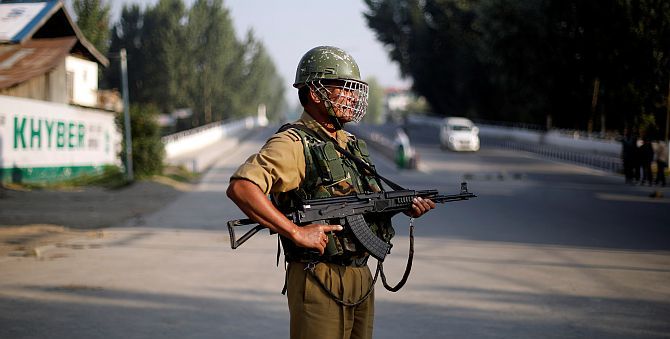
Within five days of the abrogation of Article 370 and the imposition of a total blockade on communications in Kashmir, Anuradha Bhasin, executive editor of Kashmir Times, the oldest English newspaper in Kashmir, had approached the Supreme Court to challenge the Centre's clampdown on the media and communications shutdown.
On Tuesday, August 27, the Supreme Court gave the Centre a week's notice to respond to her petition.
Back at work in Jammu, Bhasin spoke to Jyoti Punwani for Rediff.com on the current political situation in Kashmir and the possible ways in which it can unfold.
With leaders from the entire political spectrum under arrest, is there any scope for political activity in the Valley? What will be the fallout of this political vacuum?
That would depend on what the government is planning.
We don't even know how many political leaders have been detained.
We know that three former CMs, and many ministers and senior leaders are under arrest, but the details of all the arrests are not known.
The fallout would depend on two things: First: Is the government planning to release them? Or is it hoping to pressurise them to accept the political change brought about by the abrogation of Article 370?
Second: how would the leaders respond?
It's all very speculative.
I think it would be difficult for any mainstream leader to accept the government's move without fearing a backlash from the people.
Since Burhan Wani's killing in 2016, it has been reported that mainstream political leaders have lost credibility. Now, even the Hurriyat leaders and all separatists are under arrest. So who do people turn to?
That is the problem.
By these sweeping arrests, the government has blurred the lines between separatists, terrorists, stone-pelters and mainstream leaders who've kept the tricolour flying.
It's difficult to gauge the mood of the public given the clampdown.
Are they sympathetic to the mainstream leaders because they have been detained? Or, do they feel the same animosity as before, or even more animosity towards them for having been party to an arrangement which allowed the BJP a foothold in Kashmir?
A clear picture will emerge only when the government's lockdown and the people's counter shutdown ends.
There is a probability of a new leadership emerging.
A leadership comprised of the youth.
But the direction in which it might head is a matter of concern.
These are young people who've grown up amid the trauma of everyday violence and excessive militarisation.
Going by the reports post-August 5, the outcome of this new young leadership may not be entirely peaceful.
Earlier too, after Burhan Wani's killing, you heard many youth say they were ready to pick up the gun.
But there were no guns then and no money.
But after the abrogation of Article 370, the scenario changes.
Given the situation in Afghanistan, the US would want Pakistan's support.
Pakistan may push in more militants into the Valley.
This would be a low-key option for them, specially given the public mood, which is now so hostile to the Indian government.
These are the fears of what the political vacuum created by the Centre may result in.
To get a clear picture of how things actually pan out may take a year.
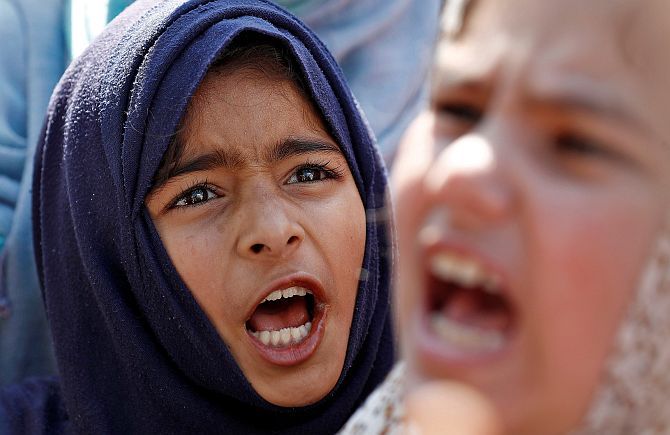
That long?
At least six months.
The government may manage to bring about fatigue in the public.
But that fatigue won't be long-lasting.
Hasn't that been the tactic of previous central governments too -- to wear Kashmiris out?
Yes, but the fatigue has never lasted long because since 2010, something or the other has kept happening.
What's different now is that since 2016 -- Burhan Wani's killing -- Kashmiris have lost the sense of fear.
So in the absence of any political leadership, have the protests since August 5 been spontaneous?
I think so.
Earlier, the government said the stone-pelters were paid Rs 500, they were mobilised into coming on the streets.
But now, all the so-called mobilisers have been detained.
So have the mainstream leaders, even heads of social organisations, fruit mandi leaders, mohalla level leaders...
When you've detained all these, then who's mobilising the protests?
These protests falsify the theory that only 5% were trouble-makers.
You have detained that 5%.
It's not only what's been done politically.
It's also the way it's been done.
It's the suffocating atmosphere.
Not even a phone line has been allowed to work! People haven't been able to reach hospitals, they haven't been able to inform close family members when someone has died...
These conditions could also have instigated the protests.

What is the government's intention in not even letting a single phone line work?
I think the government is trying to ensure there is no space for mobilisation, and also that the truth from Kashmir does not emerge.
Barring a few localities in Srinagar, we've got very few glimpses of what's happening in the Valley.
Yet, the international media has been reporting continuously from Kashmir. What about the international impact of such a situation?
This situation is harming the image of India internationally.
By any standard of democracy this lockdown is unacceptable.
The government seems immune to this, even though there's not been anything positive written about the situation in the international media.
In fact, I haven't read anything positive even in the national media.
In the national press, no Kashmiri has been quoted saying this is a good move.
It's only the TV channels that are giving you a completely different report.
Do viewers believe them? You were in Delhi, what did people tell you?
There were mixed opinions.
Very highly educated people told me the government is right, and very ordinary people said it's wrong.
These ordinary people weren't getting into the politics of the move, but they were concerned about how this clampdown was impeding daily life.
With no communication allowed, whom did you consult before deciding to file the petition in the Supreme Court?
We discussed it within our office.
This was an unprecedented lockdown.
It's not the first time communication channels have been closed, but not to this extent.
9 million people -- for in the beginning Rajouri, Poonch, Doda, Kishtwar were all affected too -- were silenced, pushed behind an iron curtain.
We are a regional paper.
What are we reporting in such a situation?
Having a firm belief in the freedom of the press and in the Constitution, I thought I must challenge this in the Supreme Court.
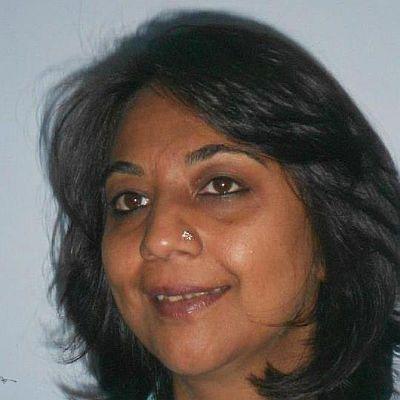 IMAGE: Anuradha Bhasin Photograph: Kind courtesy, Anuradha Bhasin/Facebook
IMAGE: Anuradha Bhasin Photograph: Kind courtesy, Anuradha Bhasin/FacebookHow did the Delhi media respond to you?
Initially the response was lukewarm, but in the last four or five days, after the Press Council of India's intervention application in favour of the government, there was a lot of solidarity.
I received tremendous support.
The last decade has seen the maximum number of Kashmirs students enrolling in universities outside Kashmir, making friends with non-Kashmiris, seeing Indians differently. Will this process come to an end now, after the abrogation of Article 370?
Getting into the minds of an entire people is difficult.
But I can say that the bitterness among Kashmiris towards India may increase unless Indian civil society makes an effort to bridge the divide.
What about the Opposition parties? Were you surprised by their stand in Parliament on this issue?
Not just on this issue.
On several issues, the Opposition has been doing nothing except saying a few words.
Take the NRC.
Even though the BJP does not have a majority in the Rajya Sabha, every bill has been getting passed and that too without being debated.
Who would have imagined that Article 370 would be abrogated just like that?
Yes! We would often talk about it, say that the BJP was going to do it, but when it happened... I've never felt defined by any strong sense of identity, I always thought of myself as a multi-cultural person.
But when Article 370 was abrogated, for two days, I went into utter depression.
I couldn't write, I couldn't do anything.
It's difficult to articulate...
It's also the way it's been done.
It was humiliating.
Had it been a majority decision... But we've not even been asked! It's a sense of betrayal that I feel.


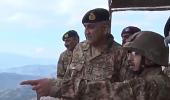





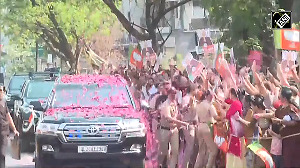
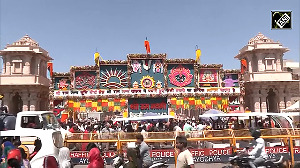

 © 2025
© 2025